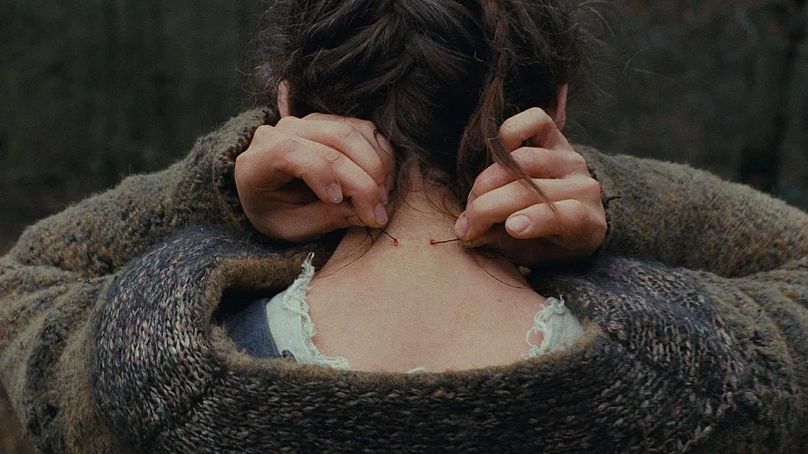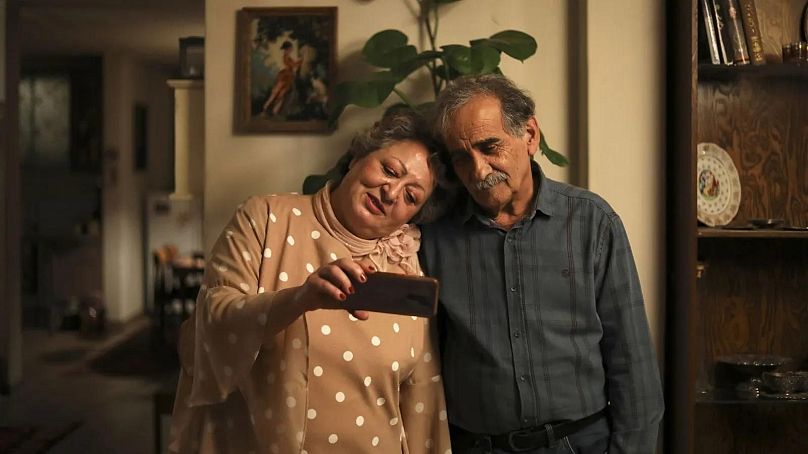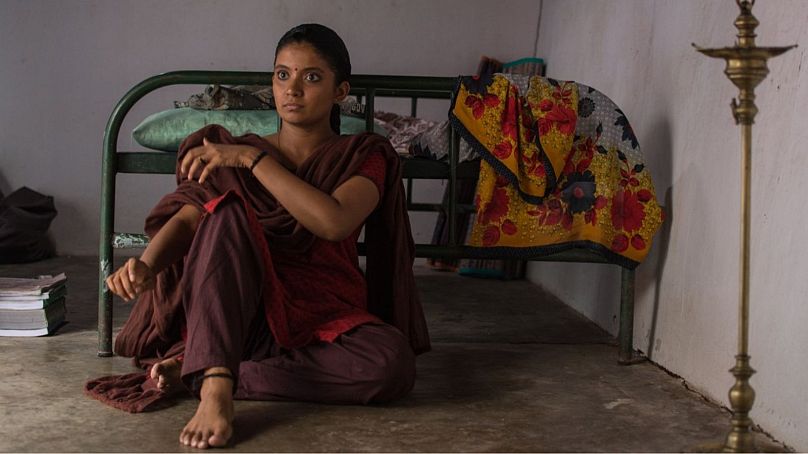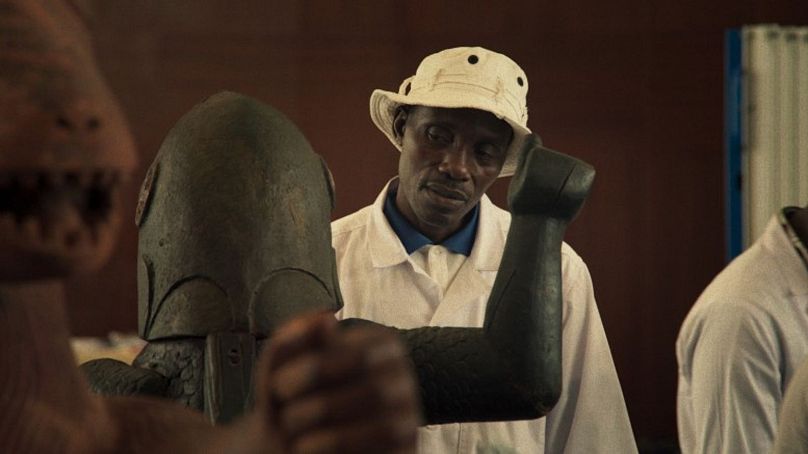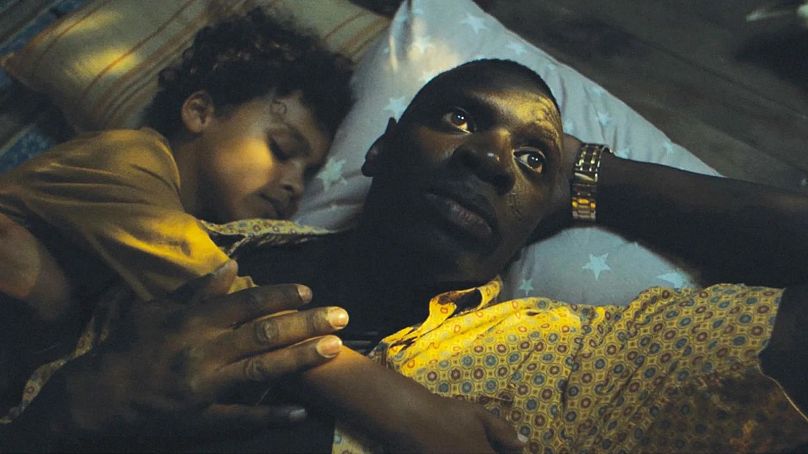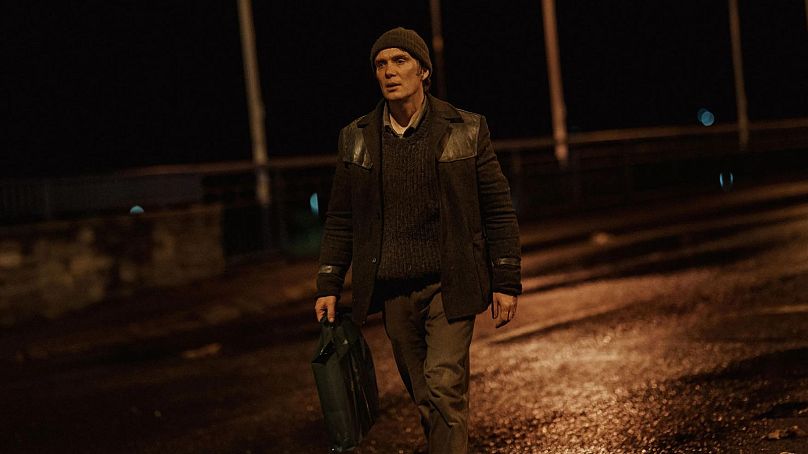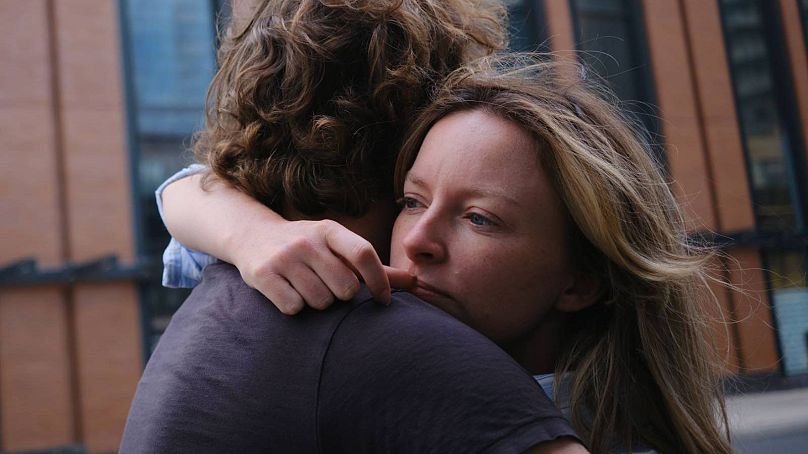Here is our Top 10 from this year's Berlin International Film Festival - keep an eye out for these gems.
The Berlin International Film Festival’s red carpets have been rolled up.
 ADVERTISEMENT
ADVERTISEMENT
 ADVERTISEMENT
ADVERTISEMENT
While we’re still wrestling with the controversial fallout of the 74th Berlinale and getting over some of the decisions made by the jury, we’re focusing on what the event, at the end of the day, is all about: quality filmmaking.
It’s time to round up our favourite films of this year’s Berlinale, giving you the lowdown on the titles you should be seeking out in cinemas over the coming year.
1) Des Teufels Bad (The Devil’s Bath)
Most descriptions for The Devil’s Bath may inadvertently discourage viewers looking for a clear notion of what they’re about to watch. As well as those looking for a carefree time at the cinema. However, to skip it would be a mistake, as it is without a doubt one of the most memorable films at this year’s Berlinale, as well as the most accomplished title in its 74th Competition.
Directed by Veronica Franz and Severin Fiala (Goodnight Mommy, The Lodge), The Devil’s Bath is a bleak but mesmerising portrait of female melancholia in 18th century Austria, one based on extensive research into historical court records. It shines an unsettling light on a previously unexplored chapter of European history, which saw hundreds of people – mostly women – finding a dogmatic loophole to avoid eternal damnation. This phenomenon of suicide by proxy is explored through the story of a young woman, Agnes, played to perfection by Anja Plaschg – the musician better known as Soap&Skin.
Plaschg also provides the ominous score, which is truly haunting. You can bet we'll be hunting for the soundtrack all year long.
The aunt-nephew directing duo put her centre stage, and by doing so, remind the viewer of how women were driven to drastic measures in order to achieve a modicum of emancipation, and that certain ecclesiastical doctrines remains alive and well to this day – thereby adding timely resonance regarding still-persistent stigma surrounding depression and suicide.
The directors use some of the horror genre’s cinematic language, but ensure that The Devil’s Bath remains an unclassifiable and tantalising slow-burn. It excels as a spine-chilling critique of religious dogma, and soars as a heart-wrenching excavation of the past’s voiceless. Above all, it casts an entrancing spell unlike any other.
The film went home with the Bear for Outstanding Artistic Contribution, awarded to cinematographer Martin Gschlacht for his striking work, but it was more than deserving of the Golden Bear this year.
Stay tuned to Euronews Culture for our interview with Veronika Franz and Severin Fiala.
Screened in Competition at the Berlinale – World Premiere.
Release date: 8 March in Austria. The film has been acquired for US, UK and Irish distribution by Shudder. TBC for other European territories – a Summer release date is rumoured.
2) Love Lies Bleeding
Following her face-melting 2019 debut film Saint Maud, which already announced Rose Glass as a major new talent to follow, the Welsh filmmaker returns with her sophomore effort, Love Lies Bleeding.
Her canvas is bigger, as she moves from the UK to the US, but we’re still confined to a small town - this time in New Mexico, in the 80s. The film follows Lou (Kristen Stewart) and her nascent relationship with ambitious bodybuilder Jackie (Katy O’Brian), and how both are put on a collision course with Lou’s estranged father, the criminal Lou Sr. (Ed Harris), after a reckless (but merited) moment of violence.
That briefest and vaguest of plot descriptions is necessary to not spoil some of the more outrageous aspects of the film, as the surprises at the heart of this uncategorisable film deserve to be kept intact.
Part revenge odyssey, part retro-noir, Love Lies Bleeding takes some bold swings and thematically harks back to Saint Maud in the way it explores devotion taken to the extreme: Glass’ first film dealt with religious fanaticism, while her follow up wrestles with love as an overpowering emotion which can consume and transform a person. Add a smattering of dark humour, a slight but interesting commentary on the all-American sense of extreme affirmation, as well as what is destined to be one of 2024’s most memorable soundtracks, and this audacious folie à deux becomes an unnervingly tactile and pulpy triumph powered by two electric performances.
Love Lies Bleeding confirms that Glass is up there with the likes of Julia Ducournau (Raw, Titane) and Prano Bailey-Bond (Censor) as one of the most distinctive new(ish) voices in cinema.
Oh, and if you haven’t seen Saint Maud yet, please do get it on it, pronto.
Screened at the Berlinale in ‘Specials’ section – European premiere.
Release date: 8 March in the US; 11 and 19 April in Netherlands and UK – European theatrical rollout to follow.
3) Keyke mahboobe man (My Favourite Cake)
This masterful Iranian tragicomedy was one of the Berlinale’s standout Competition entries, and the fact it went home emptyhanded stands as a glaring missed opportunity from this year’s jury. However, it did rightfully win this year’s FIPRESCI prize, as well as the top prize from the ecumenical jury.
Directed by Maryam Moghaddam and Behtash Sanaeeha (Ballad of a White Cow), the film sees how lonely septuagenarian widow Mahin (played by the wonderful Lily Farhadpour) decides to reconnect with the lost freedoms of her youth, now obliterated in an unrecognizable Iran. She yearns to revive her love life, and make a new connection. She finds it when she meets – more accurately, brazenly stalks – taxi driver Faramarz (Esmaeil Mehrabi). They spend an impromptu evening together, connecting, drinking, dancing, and nourishing the hope that their happiest days are not behind them. However, hope is a very fragile thing in a country that quashes it.
Shot mostly in secret around the same time as the Woman, Life, Freedom protests broke out nationwide, My Favourite Cake takes some clear shots at the repressive Iranian regime and its morality police. These are nestled within a beautiful film that dares to tackle the harsh realities Iranian women face and that portrays women as human beings with desires and supressed freedoms. And once the succinct but allegorically powerful epilogue comes about, this film truly takes form as both a poetic and politically engaged masterpiece.
Screened in Competition at the Berlinale – World premiere.
Release date: TBC. A UK-Ireland deal has been secured already, with Curzon picking up the film.
4) Kottukkaali (The Adamant Girl)
This unpredictable and deeply impactful Indian Tamil-language drama film directed by P. S. Vinothraj is one of this year’s biggest revelations.
Not that the director was unknown, having made a name for himself by winning the prestigious Tiger Award at the Rotterdam Film Festival for his 2021 first feature, Pebbles. His second film, however, was one of the Berlinale’s hidden gems.
The Adamant Girl sees two families planning the wedding of their daughter Meena (Anna Ben) and son Pandi (Soori Muthuchamy). The trouble is that Meena is in love with someone else, leading her to a state of catatonia characterised by stubborn silence. Pandi, his parents and his two wedded sisters believe her reluctance to marry him must be a case of spiritual possession. Members of both families embark on a ramshackle road trip to visit a shaman-esque “seer” who will exorcise the spirit of love from Meena.
It’s a unique road movie that confidently flirts with humour and absurdity whilst never undermining the viscerally upsetting exploration of deep-seated superstition and entrenched misogyny - and how the two are inextricably linked. The film never spoonfeeds you explanations, preferring the narrative to unfold with some lengthy, unbroken shots that pull you in deeper. Vinothraj’s subtle and unsettling examination of misogyny and internalised patriarchy in rural Indian society works wonders, as well as the terrific climax, which fizzles with poignancy and meaning.
Who knows when European audiences will be able to watch this excellent film – but don’t miss out when you see it playing.
Screened at the Berlinale in Forum section – World premiere.
Release date: TBC.
5) Architecton
Any film about rocks, whose title makes it sound like a Transformers reject, which can glue your eyes to the screen is an achievement in and of itself.
Architecton does just that. It’s a meditative tone poem that ought to have been recompensed with a Bear come awards time. Celebrated Russian non-fiction director Victor Kossakovsky already impressed with his sensory essays Aquarela, a climate change doc told through the medium of water, and Gunda, a pig’s-eye-view doc, but his latest offering is stunning.
From war-torn Ukraine to Turkey and Lebanon, we observe the evolution of natural and manmade structures. With no commentary, Kossakovsky juxtaposes images of bombed apartment blocks, raw materials dug out from mountains, remains of Roman temples, gradually leading to the exploration of how our planet cannot sustain disposable concrete constructions that we build from the fabric of Earth itself, and that there are lessons to be learned from ancient monuments.
Working with regular director of photography Ben Bernhard, Kossakovsky captures nature and manmade structures in ways never before seen, utilising drone photography to jaw-dropping effect. Equally as entrancing are certain monochrome shots which feel calming yet apocalyptic, leading to a meditation on how architecture is a way of seeing how we live and how we behave. Most of all, Architecton questions our capacity to question ourselves with regards to the structures we build and their effects on the planet.
Through this magnificently realised piece of meditative cinema, Kossakovsky echoes the words of famed Italian architect Michele De Lucchi, who appears sporadically during the film: “We need to find a new idea of beauty.”
Screened in Competition at the Berlinale – World premiere.
Release date: TBC, but it’s coming. The Match Factory has completed deals for the film in Spain, Italy, Benelux, Scandinavia and the Baltics. Neue Visionen is releasing the film in Germany, and A24 will release the film in the US.
6) Dahomey
The winner of this year’s Golden Bear was historic in many ways: the first time a Black female filmmaker wins the top prize, and the second time in a row that the main gong goes to a documentary – after last year’s On the Adamant from French filmmaker Nicolas Philibert.
Beyond the milestones, Dahomey was a worthy winner – even if My Favourite Cake and The Devil’s Bath were more striking candidates. French-Senegalese director Mati Diop, who previously won the Grand Prix at Cannes for her 2019 film Atlantics, provides a fascinating and multifaceted look at a timely issue centred around the ills of colonialism. This docu-fiction essay details the return of twenty-six artefacts from France to the Republic of Benin, which were among thousands plundered from the Kingdom of Dahomey by French colonialist troops in 1892.
Diop not only gives a literal voice to the past – a flourish which is sadly abandoned as the runtime progresses – but also explores the wreckage wrought by colonialism. In doing so, she joins the ongoing discussion regarding the repatriation of stolen artefacts and probes thorny issues surrounding Europe's return of looted antiquities to Africa.
Granted, many will see the film’s win as a purely political one, but Dahomey stands as a taut and textured point of entry into an ongoing and clearly knotty debate. What the filmmaker manages to do in the short space of 67 minutes is rather remarkable.
Screened in Competition at the Berlinale – World premiere.
Release date: Dahomey is scheduled for theatrical release in France on 25 September by Les Films du Losange. Mubi has acquired the distribution rights to the film for the US, UK, Ireland, Germany, Austria, Switzerland and Italy, and will release the film in the second half of 2024.
7) The Strangers’ Case
Winner of this year’s Amnesty International Film Award, The Strangers’ Case arrives when audiences have seen several recent films tackle the global refugee crisis.
Only last year, Matteo Garrone’s Io Capitano traced the journey of Senegalese teenagers to Italy, while Agnieszka Holland’s Green Border looked at how refugees were used as political pawns stuck in limbo between the Belarusian and Polish border.
While the heavy topic may induce some understandable audience fatigue, The Strangers’ Case is not one to skip. American activist and producer-turned-director Brandt Andersen crafts a terrific ensemble drama for his first feature film, one that works as an engaging butterfly effect jigsaw puzzle. It follows a chain reaction that involves five different families in four different countries. The tragic spark that ignites a chain of events is an explosion that forever alters the lives of a Syrian family in Aleppo. From then on, the film chronicles interweaving perspectives of a doctor, a soldier, a people smuggler, a poet and a coast guard.
Andersen confidently combines pulse-racing thrills with striking authenticity, without compromising the integrity or scope of humanitarian crises for the sake of Hollywood accessibility. Boasting an international cast that includes Palestinian-Lebanese actress Yasmine Al Massri and French star Omar Sy, The Strangers’ Case exposes the connective thread that binds lives together, and the end result is a plea for more compassion in a world that could do with significantly more.
Check out our interview with director Brandt Andersen.
Screened at the Berlinale in Specials section – World premiere.
Release date: TBC, but considering the cast and the positive reception it had for its world premiere, the first half of this year seems likely.
8) Sasquatch Sunset
This silly yet touching ode to silent(ish) cinema was one of the festival’s most pleasant surprises. There were rumours circulating that the film was a feature-length troll from directors Nathan and David Zellner (Damsel, and last year’s satirical black comedy TV series The Curse). Reality proved otherwise.
Their film follows four sasquatches (including an unrecognizable Riley Keough and Jesse Eisenberg) as the mythical creatures make their way through the mountains and forests over the course of four seasons. The hairy beasts eat, sleep, fuck, defecate, fight, play with turtles, sniff skunks, and gradually come into contact with things they don’t fully comprehend, like a red ‘X’ on a tree, or a concrete road that puzzles them to the point of distress (and urination).
There’s no dialogue. Just grunts.
What initially seems like a joke taken too far becomes one of those see-it-to-believe-it films - a strangely captivating observational nature doc, with plenty of absurdist goodness thrown in for good measure. You start to genuinely care about these creatures, and borderline cast yourself as a Bigfoot Jane Goodall trying to interpret their grunts and behaviours.
Filled with terrific physical performances, this alternatively silly and touching drama is an earnest exploration of trying to find your place in a world that may not expect, want, or be tailored to you. A weird anthropological comedy that tells a very human story.
Screened at the Berlinale in Specials section – European premiere.
Release date: The film heads to South by Southwest Film Festival in March and gets a release on 12 April in US. Europe may have to wait a while for this one...
9) Small Things Like These
This subtle and compelling film about one of Ireland’s darkest moments is powered by Cillian Murphy and a standout performance by Emily Watson – who rightly won the Bear for Best Performance in a Supporting Role.
Directed by Belgian filmmaker Tim Mielants (Peaky Blinders), Small Things Like These is sensitively adapted by playwright Enda Walsh (Hunger) from the novella of the same name by Claire Keegan - the contemporary Irish writer behind Colm Bairéad’s Oscar-nominated drama The Quiet Girl. Set in County Wexford in 1985 during the Christmas period, it is an intimate drama about the Magdalene Laundries. These were the institutions run and financed by the Catholic Church in concert with the Irish state, where an estimated 30,000 Irish women were incarcerated between the 18th and 20th centuries. The film is appropriately dedicated to the estimated tens of thousands of women that were institutionalised between 1922 and 1996 - when the last of the laundries were closed.
Unlike Peter Mullan’s searing 2002 drama The Magdalene Sisters, Small Things Like These puts the focus on the community outside of the infamous workhouses, as opposed to plunging the viewer inside a brutal portrait of how thousands of “fallen women” were forcibly institutionalised and abused within these asylums. By shifting the focus to the outside world, we witness the silent complicity of communities and how the laundries were just one of the many mechanisms used by the Catholic Church and the Irish state to regulate “deviant behaviour.”
This powerful and understated film exposes the Church’s Mafia-like stranglehold on communities, and shows how hard it is to do a purely Christian act in a dysfunctional society. Most of all, like Keegan’s novella, it presents the narrow partition between hope and ruin – to devastating effect.
Screened in Competition at the Berlinale – World premiere.
Release date: TBC, but chances are it’s soon, considering the critical reception and the fact that Murphy is on his way to an Oscar for Oppenheimer.
10) Matt And Mara
You’ve all seen a “Will-they-won't-they?” romantic comedy, but Canadian director Kazik Radwanski has crafted a far knottier “What-if-they-could?”, focusing on the interpersonal dynamics that go unnamed.
Following his 2019 film Anne at 13,000 ft, which also premiered at the Berlinale, Radwanski reteams with Deragh Campbell (Never Eat Alone, Anne from Anne at 13,000 ft) and Matt Johnson (director of The Dirties and last year’s critically acclaimed BlackBerry) for a gentle but memorable drama that doesn’t fall into the mumblecore trap this introspective indie seems to be. It sees teacher Mara (Campbell) welcoming her students to poetry class. As she is about to head into the classroom, her old friend Matt (Johnson), a published author, surprises her by randomly crashing the lesson. No matter how intrusive this may seem, she can’t manage to conceal a smile. They spend time together, reconnect, and end up taking a road trip to a conference Mara is attending. The tension between the two friends gradually becomes too close for comfort – and too close for a marriage, as Mara has a life with her husband Samir (Mounir Al-Shami) and their young daughter.
Radwanski plays with expectations, and crafts a compelling study of how one deals with an unresolved past - and now present. His portrait of the sacrifices people make in their love lives feels relatable, and the simmering sensation that what goes unsaid often holds more power than spoken words also hits home.
Not necessarily a date film should you be worried about the strong bonds your partner may have with an old friend... But a must-see, lo-fi stunner that doesn’t feel the need to numb its audience with easy answers.
Check out our interview with director Kazik Radwanski and lead actor Matt Johnson.
Screened at the Berlinale in Encounters section – World premiere.
Release date: TBC











